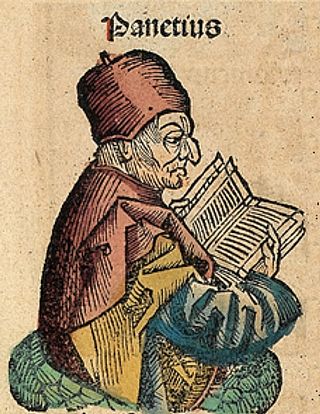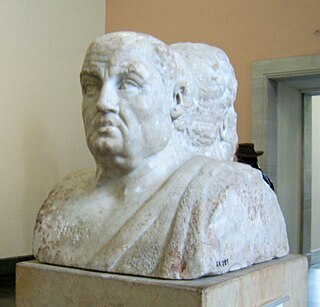Year 4 BC was a common year starting on Tuesday or Wednesday of the Julian calendar and a common year starting on Monday of the Proleptic Julian calendar. At the time, it was known as the Year of the Consulship of Sabinus and Rufus. The denomination 4 BC for this year has been used since the early medieval period, when the Anno Domini calendar era became the prevalent method in Europe for naming years.

Lucius Annaeus Seneca the Younger, usually known mononymously as Seneca, was a Stoic philosopher of Ancient Rome, a statesman, dramatist, and, in one work, satirist, from the post-Augustan age of Latin literature.

Cleanthes, of Assos, was a Greek Stoic philosopher and boxer who was the successor to Zeno of Citium as the second head (scholarch) of the Stoic school in Athens. Originally a boxer, he came to Athens where he took up philosophy, listening to Zeno's lectures. He supported himself by working as a water-carrier at night. After the death of Zeno, c. 262 BC, he became the head of the school, a post he held for the next 32 years. Cleanthes successfully preserved and developed Zeno's doctrines. He originated new ideas in Stoic physics, and developed Stoicism in accordance with the principles of materialism and pantheism. Among the fragments of Cleanthes' writings which have come down to us, the largest is a Hymn to Zeus. His pupil was Chrysippus who became one of the most important Stoic thinkers.
Apollonius is a masculine given name which may refer to:
Chaeremon of Alexandria was a Stoic philosopher and historian. His father – about whom nothing is known – was called Leonidas, and he was probably born no later than 10 AD. He may have been the grandson of the Chaeremon who accompanied the Roman prefect Aelius Gallus on his tour of Egypt in 26 AD. He was probably one of the ambassadors to Claudius from Alexandria in 40 AD. According to the Suda, he was the head of the Alexandrian school of grammarians, and he may also have been head of the Museion. He also taught Nero, probably before 49 AD when Seneca the Younger became Nero's tutor.
Hecato or Hecaton of Rhodes was a Greek Stoic philosopher.

Panaetius of Rhodes was an ancient Greek Stoic philosopher. He was a pupil of Diogenes of Babylon and Antipater of Tarsus in Athens, before moving to Rome where he did much to introduce Stoic doctrines to the city, thanks to the patronage of Scipio Aemilianus. After the death of Scipio in 129 BC, he returned to the Stoic school in Athens, and was its last undisputed scholarch. With Panaetius, Stoicism became much more eclectic. His most famous work was his On Duties, the principal source used by Cicero in his own work of the same name.
Aristo of Chios, also spelled Ariston, was a Greek Stoic philosopher and colleague of Zeno of Citium. He outlined a system of Stoic philosophy that was, in many ways, closer to earlier Cynic philosophy. He rejected the logical and physical sides of philosophy endorsed by Zeno and emphasized ethics. Although agreeing with Zeno that Virtue was the supreme good, he rejected the idea that morally indifferent things such as health and wealth could be ranked according to whether they are naturally preferred. An important philosopher in his day, his views were eventually marginalized by Zeno's successors.
Athenodoros, Athenodorus or Athinodoros may refer to:
Attalus or Attalos may refer to:
Lucio is an Italian and Spanish male given name derived from the Latin name Lucius. In Portuguese, the given name is accented Lúcio.

Ancient Roman philosophy is philosophy as it was practiced in the Roman Republic and Roman empire. Roman philosophy includes not only philosophy written in Latin, but also philosophy written in Greek in the late Republic and Roman empire. Important early Latin-language writers include Lucretius, Cicero, and Seneca the Younger. Greek was a popular language for writing about philosophy, so much so that the Roman Emperor Marcus Aurelius chose to write his Meditations in Greek.

Marius is a male given name, a Roman family name, and a modern surname.
Archedemus of Tarsus was a Stoic philosopher who flourished around 140 BC. Two of his works: On the Voice and On Elements, are mentioned by Diogenes Laërtius.
Attalus was a Stoic philosopher in the reign of Tiberius around 25 AD. He was defrauded of his property by Sejanus, and exiled where he was reduced to cultivating the ground. The elder Seneca describes him as a man of great eloquence, and by far the acutest philosopher of his age.
Quintus Sextius the Elder was a Roman philosopher, whose philosophy combined Pythagoreanism with Stoicism. His praises were frequently celebrated by Seneca.
Seneca's Consolations refers to Seneca’s three consolatory works, De Consolatione ad Marciam, De Consolatione ad Polybium, De Consolatione ad Helviam, written around 40–45 AD.

The Double Herm of Socrates and Seneca is an ancient Roman statue from the first half of the third century AD. The herm depicts the Greek philosopher Socrates on one side, and the Roman Stoic Seneca the Younger on the other. It currently belongs to the Antikensammlung Berlin, found in the Altes Museum.

De Ira is a Latin work by Seneca. The work defines and explains anger within the context of Stoic philosophy, and offers therapeutic advice on how to prevent and control anger.

The Stoic Opposition is the name given to a group of Stoic philosophers who actively opposed the autocratic rule of certain emperors in the 1st-century, particularly Nero and Domitian. Most prominent among them was Thrasea Paetus, an influential Roman senator executed by Nero. They were held in high regard by the later Stoics Epictetus and Marcus Aurelius. Thrasea, Rubellius Plautus and Barea Soranus were reputedly students of the famous Stoic teacher Musonius Rufus and as all three were executed by Nero they became known collectively as the Stoic martyrs.







